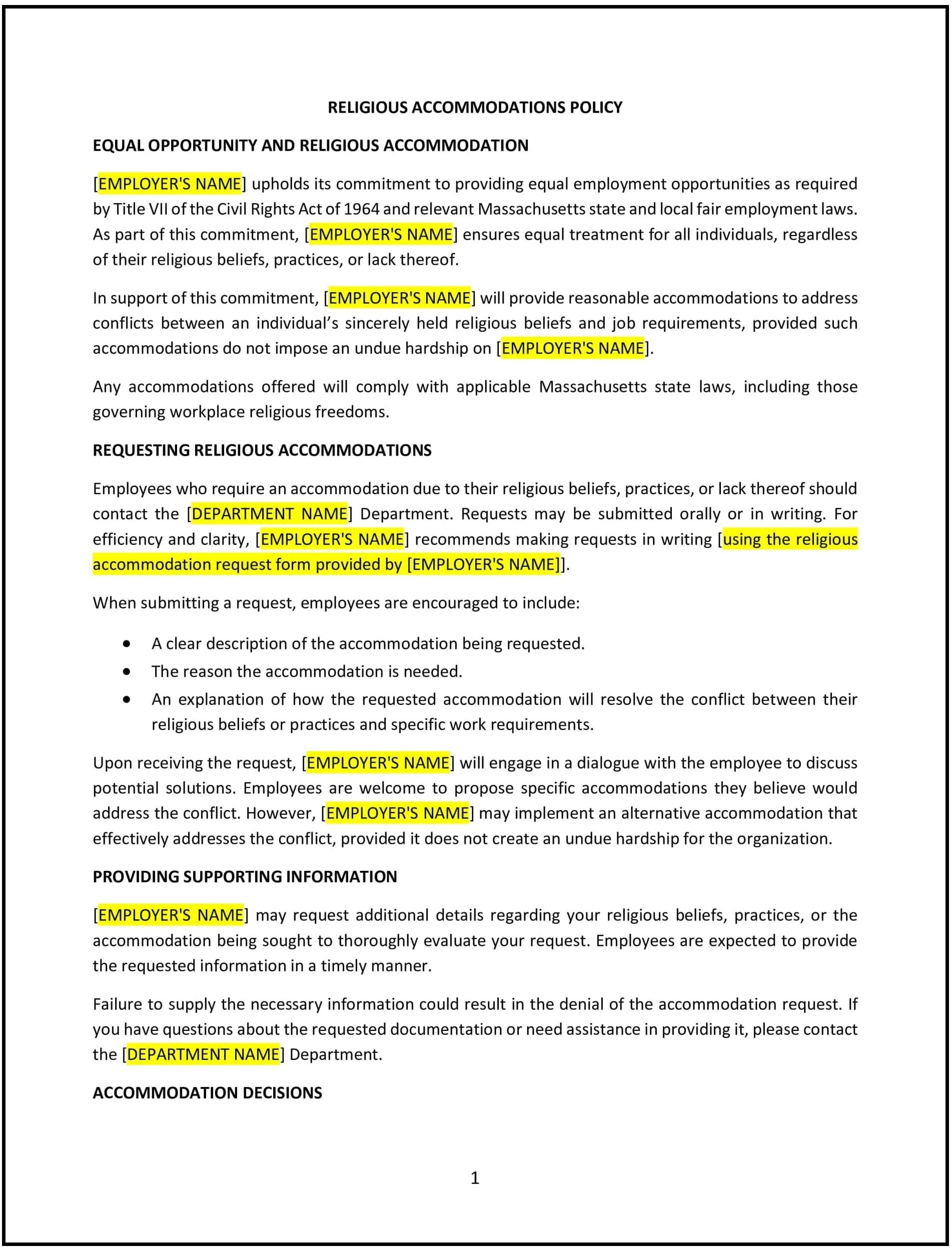Religious accommodations policy (Massachusetts): Free template
Got contracts to review? While you're here for policies, let Cobrief make contract review effortless—start your free review now.

Customize this template for free
This religious accommodations policy is designed to help Massachusetts businesses accommodate employees' religious practices and beliefs in a manner that promotes an inclusive and respectful workplace. The policy outlines the company’s approach to providing reasonable accommodations for employees whose religious beliefs or practices conflict with their work schedules, duties, or other aspects of their employment. It also promotes compliance with Massachusetts state laws and federal regulations, including Title VII of the Civil Rights Act of 1964.
By adopting this policy, businesses can support religious diversity, reduce the risk of discrimination claims, and demonstrate a commitment to creating a fair and inclusive work environment for all employees.
How to use this religious accommodations policy (Massachusetts)
- Define religious practices: Specify what constitutes a religious practice under the policy. This could include worship practices, dietary restrictions, dress codes, and observances of religious holidays. The policy should be clear that the accommodation process applies to all sincerely held religious beliefs and practices.
- Address requests for accommodation: Outline the process employees should follow to request religious accommodations. This should include how far in advance the request should be made, the documentation required (if any), and the appropriate contact person (e.g., HR or a supervisor). The policy should emphasize that requests should be made in good faith and that employees should provide enough information to help the company assess the need for accommodation.
- Determine what constitutes a reasonable accommodation: Clearly define what constitutes a "reasonable" accommodation in the context of the company’s operations. Reasonable accommodations might include flexible work schedules, shift changes, dress code modifications, or time off for religious holidays or observances. The policy should make it clear that the company will make efforts to accommodate requests but reserves the right to deny requests that would impose an undue hardship on the business.
- Address undue hardship: The policy should specify what constitutes an "undue hardship" for the business. This may include considerations such as financial cost, disruption to business operations, or safety concerns. If an accommodation request imposes an undue hardship, the company will explain this to the employee and, if possible, propose alternative accommodations.
- Maintain confidentiality: Ensure that any religious accommodation request or information is kept confidential and shared only with necessary personnel. Employees should feel comfortable making accommodation requests without fear of discrimination or retaliation.
- Ensure compliance with Massachusetts and federal laws: Ensure that the policy complies with Massachusetts state laws, such as the Massachusetts Fair Employment Practices Act, as well as federal regulations, including Title VII of the Civil Rights Act, which requires employers to provide reasonable accommodations for employees’ religious practices.
- Review and update regularly: Periodically review and update the policy to ensure it is compliant with changes in Massachusetts state laws, federal regulations, and company practices. Regular updates will help ensure that the company’s religious accommodation practices remain effective and in compliance with the law.
Benefits of using this religious accommodations policy (Massachusetts)
This policy offers several benefits for Massachusetts businesses:
- Promotes inclusivity and diversity: By offering reasonable accommodations for employees’ religious practices, businesses foster an inclusive and respectful workplace where employees from diverse religious backgrounds feel valued and supported.
- Reduces the risk of discrimination claims: Providing religious accommodations helps businesses avoid claims of religious discrimination and supports compliance with both Massachusetts state laws and federal regulations.
- Enhances employee retention: By accommodating employees' religious needs, businesses can improve job satisfaction and retain employees who might otherwise be at risk of leaving due to religious conflicts with their work schedule or duties.
- Strengthens company reputation: A company that demonstrates a commitment to supporting its employees’ religious practices is viewed positively by both current and prospective employees. This strengthens the company’s reputation as an ethical and inclusive employer.
- Increases employee morale and productivity: When employees feel that their religious beliefs are respected and that accommodations are made when necessary, their overall morale and engagement are improved, leading to higher productivity.
- Improves legal compliance: By adhering to Massachusetts state laws and federal guidelines, businesses reduce the risk of legal challenges related to religious discrimination and promote compliance with relevant legislation.
Tips for using this religious accommodations policy (Massachusetts)
- Communicate the policy clearly: Ensure that all employees are aware of the religious accommodations policy and understand how to request accommodations. Include the policy in the employee handbook and discuss it during onboarding or regular training sessions.
- Provide training for managers and HR: Train managers and HR personnel on how to handle religious accommodation requests. Managers should be prepared to address requests in a way that is respectful, confidential, and compliant with the policy.
- Maintain open communication: Create an open line of communication for employees to discuss their religious accommodation needs. Encourage employees to approach their managers or HR with questions or concerns about accommodations, and ensure that requests are handled promptly and with sensitivity.
- Address requests promptly: When an employee makes a religious accommodation request, respond as quickly as possible to avoid delays that may cause unnecessary hardship or conflict. Make every effort to accommodate the employee's needs while balancing the company's operations.
- Ensure documentation and confidentiality: Keep a record of all religious accommodation requests and approvals, and ensure that this information is stored confidentially. Only share the information with necessary personnel to protect the employee's privacy.
- Review and update regularly: Periodically review the policy to ensure it is compliant with Massachusetts state laws, federal regulations, and the evolving needs of the business. Make updates as needed to reflect changes in laws or company operations.